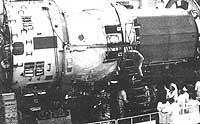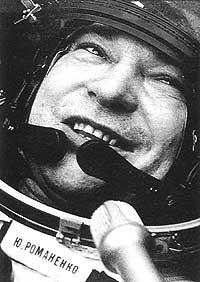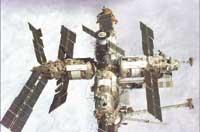237 days of fascination with space
1995/11/01 Irazabalbeitia, Inaki - kimikaria eta zientzia-dibulgatzaileaElhuyar Fundazioa | Kaltzada, Pili - Elhuyar Zientziaren Komunikazioa Iturria: Elhuyar aldizkaria
Invited by the Aranzadi Science Society, in early October Russian Oleg Aktov visited San Sebastian. In his first speech he spoke about the physiological and psychological changes that occur in the long stays in space and related his experiences in a room full of public. Aulki was not free to listen to the Aktove conference that Tuesday in October.
He is considered a normal man with an unusual profession. He speaks with passion of space, of the changes produced by microgravity in the human body and is not ashamed to recognize that he likes space. By chance, we had to summarize what Aktove told us below.
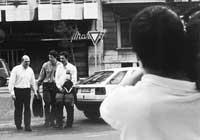
ELHUYAR-ZETIAZ: What led him to be a cosmonaut?
OLEG ATKOV: The first thing I mean is that I am a cardiologist and therefore I can talk about space from what I am a doctor. When long stays are made in space, it is known that there are many changes in the human body. I wanted to know all these processes of change. Fortunately, at the end of the studies I had the opportunity to present myself to a project that allowed me to study in the environment in which these important physiological changes occur, that is, in the space itself. Curiously I became the first cosmonaut doctor in the Soviet Union.
N-D: This option did not come suddenly. What is the selection process?
Or. A. We have to overcome many tests and the learning process is very long. First, the physical capacity is analyzed, that is, tests are carried out corresponding to the physical characteristics of the candidates: blood analysis, x-rays, detailed study of the cardiovascular system, etc. It must be confirmed that your body is able to overcome the harsh conditions imposed by space before continuing. Within this set of tests the centrifuge test is performed, which consists of getting used to a rotating machine that simulates the acceleration and rotation movements of the space, continuously turning right, left, up and down. The first phase of the process is long and hard and at the same time it is the beginning of the training project. Below are the tests typical of the activity and finally the phase of specialization. The essence of the latter lies in the full control of space: even if it is a doctor, it is necessary to learn to drive space, to use radars, to dominate control and security systems or to respond to unforeseen events.
As can be seen, training is very hard and few candidates manage to overcome everything.
N-D: Is the end of this process going into space?
Or. A. Of course! The above is part of the first selection and training process. From there comes the training. The mind and body, that is, both must be able to withstand the pressure they can bear in space, especially if long stays are desired. Our training is a combination of all these elements: health training, physical and emotional training, special preparation for endurance, temperature adaptation, etc. Of course, all accompanied by technical training. In my case, since I submitted to the first screening test until I finished all the steps I've exposed, 7 years passed. That time is very important because you start familiarizing yourself with space: in some moments you would give life itself in exchange for an opportunity to go to space, but in other cases the motivation fails and you feel an enthusiasm to leave everything. Among those who passed the first selection, only one received the invitation to go to the space and being the first team I was very happy.
N-D: What kind of group training should be done among team members?
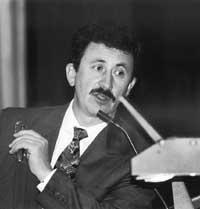
Or. A. I think one of the most important parts of the training process is teamwork. We have been in it for a year. The training performed by the team in its entirety is very important to prepare all the details of the stay. And you have to do a lot of time in space with the complete but simple help of these companions: it is a small space, after all, the space and there are many tasks to do. All these characteristics require complete coordination among the group members. The equipment must be prepared to respond correctly to what may occur in space and, as is known, in space anything can occur. N-D: His main task in this expedition was to analyze the changes that long stays in space cause in humanization. What are the most common ones?
Or. A. Those who have not been in space know that long stays mark us very demanding living conditions. The main problem is the microgravity problem, which makes life in space have nothing to do with the terrestrial. In the face of these living conditions, the body responds and important changes occur. Some of these changes are physiological: the hormonal balance changes radically, the locomotor apparatus adapts to the new situation and, for example, muscle mass is lost. Blood circulation also changes and important adaptations occur in the distribution of basic fluids. All these problems could be included in the same group, that is, in the section of physiological problems.
Psychological problems are also considered health problems and are analyzed during extended stays in space. The most serious and even more dangerous health problem for the cosmonaut who must remain in space for a long time arises from the combination of physiological and psychological restlessness.
N-D: And in the face of these problems, how is the human body prepared?
Or. A. Mainly through training and training processes. One way to alleviate the psychological problems I have mentioned, for example, are the usual communications we make from space with the control center. Although it seems like a simplicity, it is very good to be able to talk to your family members so that they can keep track of life on the ground.
On the other hand, extended stays require a series of control measures that are essential to protect us. For example, we carry remedies, we have prepared to receive psychological stimulation, etc. We do not need radiation protection because space itself protects us. In any case, if in the future we want to go to the other planets of the Solar System, we must have radiation protection. This will be one of the most important challenges.
N-D: From the point of view of your experience, what are the long stays in space for?
Or. A. In some moments of the space race we hear many opinions contrary to the stays. Opponents of these projects argued that they were too expensive and had no immediate use. If we analyze it from a purely economic perspective, it is so. However, the objectives of long stays are always scientific and are very important in this regard. In short, long stays in space are a kind of training tests that must be done in the face of more important steps that will take place in the future. Because if we want to go to the other planets we will need a lot of information.
In order to go to Mars it is necessary to know if the human body is able to adapt to the conditions of space, how it adapts, the changes that occur, etc. Without this information it will be impossible to know the planets that make up the Solar System, or what is the same, we cannot overcome the current limitations of scientific knowledge.
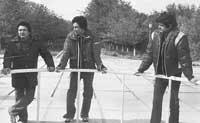
N-D: The first steps are being taken to know the planets of the Solar System. Do you think this is a short-term challenge?
Or. A. With all our technical means, scientific knowledge, economic resources, experience and time, I will tell you yes and no doubt. In my opinion, before starting this step, you have to answer a simple question that any of us can ask: Why do we have to go to Mars? I do not know how to answer this question if it is not from the strictly scientific point of view.
On the contrary, this question also demands a correct social response and until it reaches, the objectives of the trip to Mars will not be fixed. However, I scientifically come up with many possible answers. Why do we work archaeology? The origin of our century, that is, because we want to know what we are. The answer to my question is the same: space is part of ourselves or, more specifically, we are part of space. I think that knowledge will serve to better understand who we are.
N-D: In recent times there has been a quite intense debate between space stays guided by robots or humans. After hearing opinions for and against, what do you think will be the main one?
Or. A. I think that debate has no future. In fact, it is not necessary to divide both types of rooms, since in the space will be a work for all. Some of the studies that must be done can be done by robots, but others will be done by the human being without intentionality. It is necessary to combine both types of stays. I think that's where the debate ends.
N-D: At the moment there is talk of a main project: Travel to Tuesday. The time of the space race is over and everything points to a collaborative project being the first to reach Mars. What do you think?
Or. A. I am realistic and therefore optimistic. My professional experience has allowed me to know closely different projects for Mars. I have the excuse that I know in detail the projects that have been carried out so far and those that will be carried out in the next two years. For example, at this time there is an interesting project underway for robots to extract samples from Martitz's skin and investigate. It will be the first step to know the cover of Martitze and its most concrete characteristics and from there... As for the arrival of man on Mars, as I said before, we must ask ourselves about the real purpose of this journey.
However, man will come to Mars. In that we are. The most shocking moments will not live in the coming years, but not all of these projects have remained in wet paper and we are currently working. As you know, in space we have a stable station and, somehow, we could say that we have already taken the first step to Mars. Of course, this step is physical, that is, we are closer to Mars, but it also has other views. In fact, the main works carried out to date at the stable station have been carried out in collaboration. In the coming years that will be the spoon.
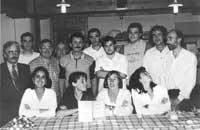
N-D: In the space station “Saliut-7” spent 237 days beating all existing brands. What does each of those days take place in space?
Or. A. As we have said, our body and our mind must be willing to give long stays in a narrow space at the time of the challenge. But reality and theory do not always coincide. We live in space at the official time of Moscow. Like you, we get up in the morning and have breakfast; we are working on it and our most important task is to perform a multitude of experiments. In addition, exercise eats us much of the day, as we devote a couple of times a day and an hour a day. It seems a lot, but it is absolutely necessary if you want to avoid some health problems. After eating, we continue to work throughout the afternoon and at night, at the end of the work, we have dinner together, analyzing what we have done during the day and preparing what we will do the next day. Once the planned activities are finished, reading or watching videos are our only tasks and this is where time goes. You have to try to keep yourself busy.
237 working daysAbout 25,000 images of the Earth were collected; 200 medical and biological experiments; 46 observations on exposure to x-rays or gamma, i.e. roentgen; 2,100 computer orders and 1,800 radiograms sent. On the occasion of their landing on October 2, 1984, the three cosmonauts who were in the Saliut-7 space station who had done all these works. It was the longest stay until then and obviously one of the most productive. Although the medical experiments conducted by Oleg Aktove had special relevance, the rest of the research carried out at the Saliut-7 space station was also of great relevance. Three cosmonauts who worked in different fields and then had a great use in space. Among others, the Earth's natural resources were investigated and many interesting data on minerals and forest exploitation were collected. As for astrophysics, studies were conducted on radiation from roentgen and the influence of ultraviolet rays could be closely analyzed. The transmission of heat in the materials and the processes of change that these materials suffer were also defined with great precision. |
Fans of astronomy Jon Andoni Boneta*Most of the issues that Oleg Aktove mentioned in the subsequent interview were heard in the conferences organized by the Astronomy Department of the Aranzadi Science Society. This is not the option given every day. We are happy with the success of this year's day, which can be proud to attract the interest of people with few resources. The Department of Astronomy of the Society of Sciences Aranzadi was born in 1977 from the Astronomical Society of Gipuzkoa. Currently, of the 1,800 members of Aranzadi, 150 belong to this section. 15 people collaborate in the organization and as promoters in the meetings held every Tuesday. All the activities of the Department have a double objective: the first is to make observations, that is, to observe the phenomena that occur when kneading with our low tools. The second is to make known what is seen, the dissemination of Astronomy. Obviously, both goals could move at once and that would encourage our hobby. Following these objectives, we began to organize talks in the department. At first we met at the rock, but because the issues were increasingly attractive, we decided to open the doors: since then, non-member astronomers have also approached. We have managed to gather more and more friendships. The next important step was in 1991, when we first organized the Astronomy Days. Until there was not much money, we had to limit ourselves to bringing characters from our environment. We invented it, because that first program was more successful than we thought. This led us to organize the second days. The Provincial Council of Gipuzkoa decided to subsidize and thanks to this we contribute to Cambridge, Canary and astrophysicists and scientists of Madrid. The days have followed a rhythm of their own. The invited experts put us in touch with other experts, who year after year have been creating a network structure. Among the guests, the researchers have been protagonists so far and through their sessions we have been able to know the most cutting-edge research. In any case, guests are asked to make the speech understandable to expose science in a way that is understandable to all of us. We believe it is a disclosure. Among the activities organized by our department, observations and exits occupy an important place. Each year two main exits are organized: one at night to observe the different objects in the kneading and another in the day to see the sunspots. The one who leaves and approaches the telescope to the street is explained how it is used, what elements and characteristics of the tooling and what you can see. We also call it disclosure. The level of the days is increasing. It will be difficult to complete the brand you have put this year, but we are already working on it. The key to success and failure lies in obtaining grants. This year we had some money, since it is expensive to bring foreign characters who do not know Basque or Spanish. The following year, our dream will have to limit the money. Although we have already said it many times, you will apologize because it is important to say it again. I want to emphasize that this is the group of people who are dedicated to organizing all these activities: a group of fans who, for the sake of astronomy, know how to work as hobbies, without seeing anything. Finally, I would like to mention the Provincial Council of Gipuzkoa and Kutxa. The first, because it also has the merit of the success of the days with the grant, and the second, because it has left us its hall of events in exchange for music. |

Gai honi buruzko eduki gehiago
Elhuyarrek garatutako teknologia




